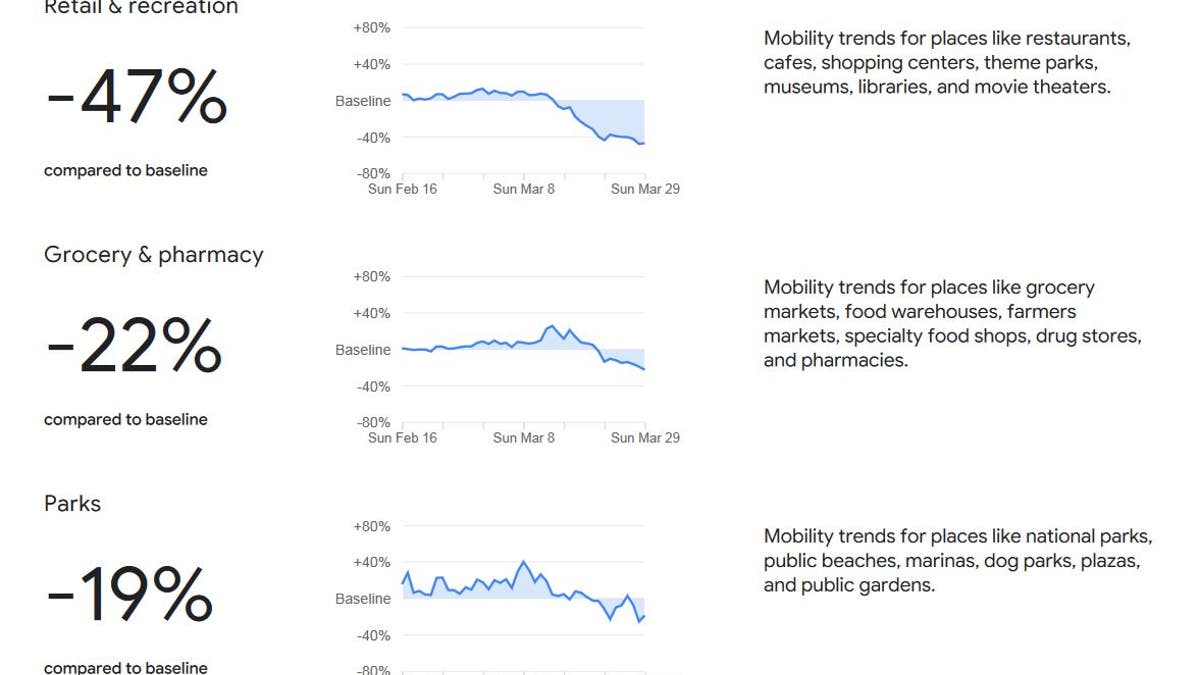Fox News Flash top headlines for April 3
Fox News Flash top headlines are here. Check out what's clicking on Foxnews.com.
Get all the latest news on coronavirus and more delivered daily to your inbox. Sign up here.
Google location data released Friday presents a stark picture of how the coronavirus pandemic has upended the lives of more than 3.9 billion people -- half the world's population -- who are under some form of lockdown, causing massive shifts in human behavior.
The report uses location data from users who have opted in to share such data to chart movement trends over time across 131 countries and regions, examining categories like retail, groceries, transit stations, workplaces and residential. Looking at America as a whole, the largest declines have come in retail and recreation and transit stations, according to the Google data.
"As global communities respond to the COVID-19 pandemic, there has been an increasing emphasis on public health strategies, like social distancing measures, to slow the rate of transmission. In Google Maps, we use aggregated, anonymized data showing how busy certain types of places are — helping identify when a local business tends to be the most crowded," the company said in a blog post. "We have heard from public health officials that this same type of aggregated, anonymized data could be helpful as they make critical decisions to combat COVID-19."
CORONAVIRUS COULD WORSEN THE US CHILDHOOD OBESITY CRISIS

Data supplied by Google shows a dramatic drop in a wide range of daily activities across the U.S.
GOOGLE TO LIFT BAN ON CORONAVIRUS-RELATED ADVERTISING
The tech giant stressed that no personally identifiable information, like an individual’s location, contacts or movement, is made available at any point.
The data reveals a wide range of behaviors, depending on the state, what rules have been put in place and how much COVID-10 is impacting the population.
For instance, in New York, which is the deadly virus' epicenter and is operating under Gov. Andrew Cuomo's PAUSE policy, retail and recreation dropped 62 percent, transit dropped 68 percent and workplaces dropped 46 percent.
However, in states like Wyoming and North Dakota, both of which have very small numbers of confirmed coronavirus cases and are not under mandatory shelter-in-place orders as of Friday afternoon, the data tells a different story.
DEMAND FOR N95 RESPIRATORS IS 17 TIMES HIGHER THAN NORMAL, SURVEY REVEALS
Wyoming has seen workplace and transit trips drop 29 and 14 percent, respectively. North Dakota has seen retail and recreation drop 44 percent and transit drop 36 percent.
President Trump has not issued a nationwide shelter-in-place order. This week, in response to a reporter's question on CNN, Dr. Anthony Fauci said he 'didn't understand why' every state had not issued stay-at-home orders.

